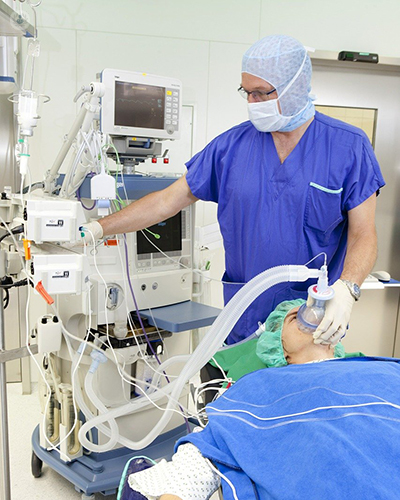General anaesthesia
Dr Rajesh Menon - Pain medicine
Created on: 05-26-2017
Updated on: 07-14-2023
Edited by: Aoife Maguire
What is general anaesthesia?
Sedation and general anaesthesia decrease or eliminate pain by administering certain substances to the patient during a surgery or procedure. General anaesthesia is a reversible and temporary state of controlled unconsciousness, causing temporary disruption of activity of the central nervous system, which consequently results in the temporary loss of pain reception throughout the body.

Why is general anaesthesia used?
General anaesthesia is used to keep a patient asleep and painless during procedures that would otherwise be too painful. Often, it is safer to have a patient unconscious during certain operations.
What is general anaesthesia?
The anaesthesia medication is usually given intravenously through a cannula in the back of your hand, although it can also be given by gas, which is breathed through a mask. General anaesthesia is fast-acting and patients feel light-headed and fall unconscious within a minute or so. Throughout the procedure, the anaesthetist remains with the patient, carefully maintaining the controlled state of unconsciousness. Thanks to general anaesthesia, the patient does not move, feel any pain or have any memory of the procedure.
Preparation for general anaesthesia
It is important to inform the specialist what medicines you are taking, any allergies you have, and also if you are pregnant. In the days before surgery, the specialist takes a patient's medical history to determine the type and amount of anaesthesia to be provided.
It is also necessary to stop taking medications that can hinder blood clotting and it is recommended to quit smoking in the weeks leading up the surgery. You may also have to avoid food for a given period beforehand.
Aftercare following general anaesthesia
After surgery, patients will slowly wake up, but it is common to feel foggy or confused for a short period. General anaesthesia can affect memory, reflexes and concentration for a day or two following surgery, so it is important to have someone look after you in that time period. The patient may also wake up feeling nauseous, with a dry mouth, sore throat or feel cold. These side effects are monitored by the nursing staff and go away after a few hours.






